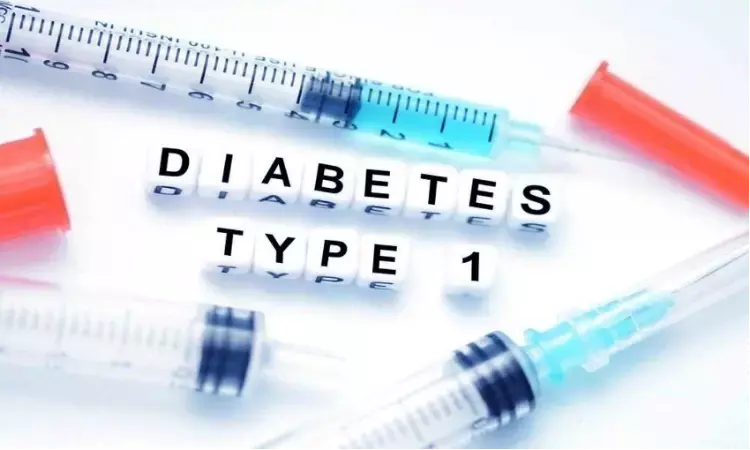- Home
- Medical news & Guidelines
- Anesthesiology
- Cardiology and CTVS
- Critical Care
- Dentistry
- Dermatology
- Diabetes and Endocrinology
- ENT
- Gastroenterology
- Medicine
- Nephrology
- Neurology
- Obstretics-Gynaecology
- Oncology
- Ophthalmology
- Orthopaedics
- Pediatrics-Neonatology
- Psychiatry
- Pulmonology
- Radiology
- Surgery
- Urology
- Laboratory Medicine
- Diet
- Nursing
- Paramedical
- Physiotherapy
- Health news
- Fact Check
- Bone Health Fact Check
- Brain Health Fact Check
- Cancer Related Fact Check
- Child Care Fact Check
- Dental and oral health fact check
- Diabetes and metabolic health fact check
- Diet and Nutrition Fact Check
- Eye and ENT Care Fact Check
- Fitness fact check
- Gut health fact check
- Heart health fact check
- Kidney health fact check
- Medical education fact check
- Men's health fact check
- Respiratory fact check
- Skin and hair care fact check
- Vaccine and Immunization fact check
- Women's health fact check
- AYUSH
- State News
- Andaman and Nicobar Islands
- Andhra Pradesh
- Arunachal Pradesh
- Assam
- Bihar
- Chandigarh
- Chattisgarh
- Dadra and Nagar Haveli
- Daman and Diu
- Delhi
- Goa
- Gujarat
- Haryana
- Himachal Pradesh
- Jammu & Kashmir
- Jharkhand
- Karnataka
- Kerala
- Ladakh
- Lakshadweep
- Madhya Pradesh
- Maharashtra
- Manipur
- Meghalaya
- Mizoram
- Nagaland
- Odisha
- Puducherry
- Punjab
- Rajasthan
- Sikkim
- Tamil Nadu
- Telangana
- Tripura
- Uttar Pradesh
- Uttrakhand
- West Bengal
- Medical Education
- Industry
CGM improves blood sugar control, prevents hypoglycemia in T1D: Study

With advent of new technology of continuous glucose monitoring (CGM), the classic portable blood glucose meters, which require a prick in the finger several times daily are gradually losing ground. More and more people with type 1 diabetes have access to the new technology.
Researchers at the University of Gothenburg have found in a new study that using the CGM tool, with its continuous monitoring of blood sugar levels, has favorable effects over several years. The continuous glucose monitoring not only leads to a better control of blood sugar but it prevents hypoglycemia or sudden fall of blood sugar in patients with type 1 Diabetes.
The researchers conducted the study to evaluate the fact that to what extent CGM improves and helps to maintain blood sugar control, treatment satisfaction, diabetes distress, hypoglycemic concerns, and overall well-being over longer periods of time.
The results of the study have been published in the scientific journal Diabetes Care.
With CGM, nonstop measurement of blood glucose takes place by means of a fine subcutaneous fiber thread that tracks and, by telephone or a separate device, reports the blood sugar of the person wearing it. An alarm can be set to issue a warning if the figure becomes too low or high. Previous clinical CGM trials had investigated its use over roughly six months. In the latest trial, patients were followed up for much longer: two and a half years.
The study comprised 108 adult patients at 13 hospitals in Sweden. All the patients were being treated with insulin injections.
The results demonstrate that CGM has several long-term positive effects for people with type 1 diabetes. The patients' average blood sugar, in terms of glycated hemoglobin, (HbA1c) level, fell by 4 mmol/mol during the trial period. This is a clear improvement, despite the patients with CGM receiving less support from hospital staff during the study period than they had done before, with capillary testing, the older technique.
The duration of episodes with much lower blood sugar levels, below 3.0 mmol/mol, which have a cognitive effect and are often unpleasant for the patient, decreased by approximately 70%. The patients' blood sugar fluctuated less, they found CGM more comfortable and enjoyable, and they were less apprehensive about excessively low blood sugar levels.
The technique thus had effects that both gave the patients medical protection and enhanced their mental wellbeing, thereby providing scope for long-term, efficacious treatment.
In charge of the study was Marcus Lind, Professor of Diabetology at Sahlgrenska Academy, University of Gothenburg, and chief physician at Uddevalla Hospital. The work was carried out at the research unit in NU Hospital Group that he leads.
"Nowadays, most people with type 1 diabetes in Sweden get CGM. However, it's important for decision makers to use longer-term data as a basis for deciding which treatments to subsidize and support," Lind says. "We've had periods when CGM has been questioned in some parts of the country, although it's become steadily more established over time. Robust data are also important at times when financing of various technical aids is increasingly being discussed."
"The study is also important from an international point of view, since CGM isn't available for most people in the world with type 1 diabetes - and this applies in Western countries as well. Long-term data are needed to enable more patients to use CGM. The present study shows that when patients use it and also receive support at the level recommended in clinical practice for extended periods, many vital variables improve for people with type 1 diabetes. So this study is important for type 1 diabetic patients worldwide," Lind concludes.
For further reference log on to:
Dr Kamal Kant Kohli-MBBS, DTCD- a chest specialist with more than 30 years of practice and a flair for writing clinical articles, Dr Kamal Kant Kohli joined Medical Dialogues as a Chief Editor of Medical News. Besides writing articles, as an editor, he proofreads and verifies all the medical content published on Medical Dialogues including those coming from journals, studies,medical conferences,guidelines etc. Email: drkohli@medicaldialogues.in. Contact no. 011-43720751


